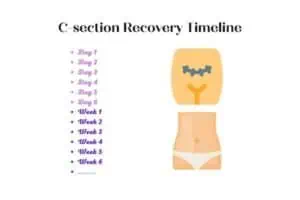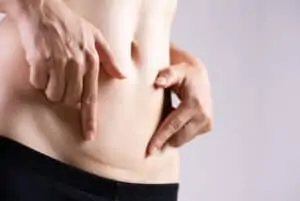After a c-section, you’ll spend some time in the hospital recovering. Totally normal. But once you get out and are back at home, you’re going to want to get back into your groove. Or your new groove with the baby.
Let me tell you though; nothing is going to be the same. Nothing. And you’re going to feel nuts (thanks hormones) for a couple of weeks at least. That’s the baby blues, which you can read about here. And just an FYI, if you feel that way for more than two weeks, contact your doctor straight away to help you. There is a help, and you will feel so much better when you get it.
Just because you’re discharged from the hospital and sleeping in your bed doesn’t mean you’re ready to get back to life at the fullest. You’re going to be in a considerable amount of pain. This, too, is normal. You may think you’re going to feel like this forever, but I assure you, you will soon be moving around pain-free.
Is there a way to speed up your recovery?
I’m so glad you asked because, yes, there is! I’ve crafted a list of do’s and don’ts of what to do after your c-section and further separated them into sections so you can have the best and speediest recovery possible. Just hang in there, and I hope your husband isn’t as hilarious as mine or your whole abdomen will ache with every laugh.
Do’s and Don’ts While You’re Still in the Hospital After a C-Section
You’re going to feel pretty rough after your c-section, and you’ll still have the catheter in for a short while. Once it comes out, though, the hospital staff will encourage you to move around and to use the toilet.
Here are some things to do and not do while you’re still admitted.
DO: Take it slow.
Yes, it’s important to get up and walk around. But even if you were a marathon runner before giving birth, you need to ease back into simple walking. Keep your walks short and sweet.
DON’T: Walk alone.
Make sure your husband or a loved one, or even hospital staff if no one else can be there, escorts you. You’re more prone to falling.
DO: Take the pain meds.
It is so much easier to recover when you’re not in agony. I speak from experience.
DO: Try to pass gas.
The only time farting is not a total faux pas is right after you’ve had a c-section. In fact, your doctor and nurses at the hospital will be urging you to do so. Side bonus: you will be allowed to eat solid foods after this. Read my post about that here!
Physical Activity Do’s and Don’ts Once You Get Home from the Hospital After C-Section
Once the hospital deems you fit for release (usually 3 to 4 days, sometimes longer), you can rejoice and head home. And while you should absolutely enjoy being back in familiar territory, there are some things you should and shouldn’t do in regards to physical activity once you get there.
DO: Keep up the walking.
Every day, take time to walk. Slowly increase the length of your walk. You may feel more comfortable with your husband, friends, or family along with you. If you live in a place with clean, fresh air, taking the baby along is a great way to bond as well as soothe a cranky baby into sleep.

And by the way, that walking will help your circulation as well as keep you from getting constipated. Remember, this is major abdominal surgery. All your parts need a little coaxing to keep things moving.
DON’T: Overdo it.
You should never push yourself too hard. This is not the time to lift weights or try running. You can lift the baby, but nothing heavier than that.
DO: Spend time enjoying your baby.
It’s definitely weird to come home with this strange-looking wrinkly creature that was once kicking you from the inside just a few days before. But you should soon start to feel that sweet bond forming between the two of you. I still tear up when I look at my girls and think of how much I loved cuddling them as babies.
DON’T: Submerge yourself in water.
Baths and swimming are not recommended during this time. Once you have your postpartum checkup in several more weeks, your doctor will let you know if you’ve healed up enough to do either of these.
DON’T: Engage in rigorous activity.
Again, wait for your doctor’s A-OK on this one. Also in this area: sex. You will have to wait until you’re recovered and cleared for that too. A downer, I know, and fair warning: it hurts the first few times after having a baby (yes, even after c-sections) so get ready to feel virginal again.
Diet Do’s and Don’ts After C-Section
It’s so important to nourish your body after this major surgery. And it’s not just for you. If you’re breastfeeding, you need to feed yourself even more so your milk can nourish your baby. Here’s what you should know!
DO: Eat well-balanced meals.
Fill your plate with healthy, nourishing foods. You can undoubtedly splurge on something you missed during your pregnancy days, but keep it to a minimum. A slice of veggie pizza is fine, but a whole pie? No way, girl! Your meals should consist of whole foods (and not whole pies).
DON’T: Drink sodas.
All that sugar. And all that fizz. And all your digestive woes as you recover. No, no, and nope. Drink plenty of water instead or decaffeinated green tea.
DO: Work in more fiber.
Foods with more fiber will help you keep your digestive system moving. Try eating them naturally. If you find you’re often constipated even with eating fiber-rich foods, ask your doctor to recommend a safe fiber supplement.
DON’T: Fad diet.
Fad diets don’t really work for anyone, and they’re going to be even more harmful to you in your delicate recovery state. Patience, my dear. With balance and your recovery, you will see results.
General Do’s and Don’ts After C-Section
What else should you know about recovering faster from your c-section? Keep reading, and you’ll know!
DO: Follow directions for cleaning your incision area.
Your doctor and the nurses at the hospital will tell you what to do to keep your incision area clean the right way.
DON’T: Ignore signs of infection.
Some pain in the abdominal region is very normal after having a c-section. However, if you notice any swelling, redness, or pus around your incision, you should contact your doctor right away. Call even faster if you have a fever over 100.4F.
DO: Relax about vaginal bleeding, to an extent
Lochia, the bleeding from your vagina after giving birth, is a normal bodily function. This blood will get less and less through the passing days. About four days after delivery, you should notice the flow is improving. If it gets worse or turns bright red though, then you have cause for concern and need to notify your doctor immediately.
DON’T: Compromise your mental health.

I’ve written about the baby blues before. I remember having them myself. And then just like that, poof! They were gone in 2 weeks. Having a baby is a huge change that affects your body, your mind, and the way life was for you. Instead of just hopping in the car to run errands now, you’ve got to prepare this tiny little person to come along too.
If it’s cold, you’re grabbing jackets. You’re trying to remember wipes and diapers and all that stuff. You get ready to leave, and your baby shows all the signs of being hungry, so you settle back down to feed her and then it’s another 30 to 45 minutes before you’re out the door. Ah, yes, Mom-Life.
With all these changes, it’s understandable that you will cry at the drop of a hat, feel confused, depressed, and like you can’t hack it. This is why you absolutely must ask for help from those around you. Don’t be shy. Ask your husband, your parents, his parents, other relatives, and friends to help out. Most of them will likely offer.
And make use of delivery services to save your sanity. How I wish I had these things when my girls were babies! Luckily, I had my husband and his parents to help out when I really needed a break. With the language barrier, though, I felt so lonely.
Again,
I’m going to mention how much my breastfeeding coach, Vivien, who was a volunteer for La Leche League, helped me during this time. She answered my calls when I felt like I was hanging on by a single, unraveling thread and helped me regain my focus. She had told me that my feelings were all normal but if they persisted after a few weeks, to tell my doctor.
Thankfully, it was the baby blues.
One of my friends had postpartum depression, the very reason why she refused to have another child. A fellow psychologist, she was ashamed to ask for help until it was almost too late. She said if she’d reached out sooner, her life would have been so much easier. So from her to me and now to you, please tell your doctor if you are feeling depressed, hopeless, sad, or have evil thoughts that persist two weeks after your c-section.
Ok, that one was a long one, but mental health is vital, and I think so many people overlook it. Physical health is something we can see. It’s tangible. If we’re ill, we look generally look sick. But when we’re mentally unwell, we can smile on the outside, and no one notices the torment within.
Moving on, there is one more thing I want to leave you with…
DO: Rest.
It’s sometimes hard to do with a newborn in the house. But it’s imperative that you do. Not just for your mental health as a lack of sleep will make anyone go mad. It’s also for your physical health.
The cells in your body all make their best recovery while you are resting. When your body is in a state of rest, it puts less demand on everything, allowing the cells to get to work. They will send more oxygen to your incision site and help your internal organs heal from the c-section.
Again, ASK FOR HELP.
It’s pretty much impossible to get a full night of sleep with a baby in the house, so take what you can get. An hour nap in the afternoon, while Grandpa and Grandma come to cuddle the baby, will undoubtedly help.
Also, breastfeed your newborn and once she’s asleep again, get your rest too. That pile of laundry in the corner? Those dishes in the sink. LEAVE THEM. You will be less prone to emotions of hopelessness and despair if you put your needs for rest and recovery first, I promise.
Final Thoughts
If you haven’t yet gone in for your c-section, don’t forget to read up on what you should do before the surgery (I wrote about that here). Mainly, don’t eat or drink after midnight. Also, take a nice, long shower. It will be the last one you get for a while and the longest one you’ll have for months until the baby cries less.
Take it easy going into and especially coming out of it. Go with baby steps all the way to baby your body so you can be the best mommy to that baby!
Leslie Berry lives with her husband and two young daughters in Los Altos, California, where she loves helping other moms get comfortable with motherhood and embracing the insanity with facts peppered with laughs.
She loves eating too much sushi, exercising, and jamming out on her Fender. Read more about Leslie here.






